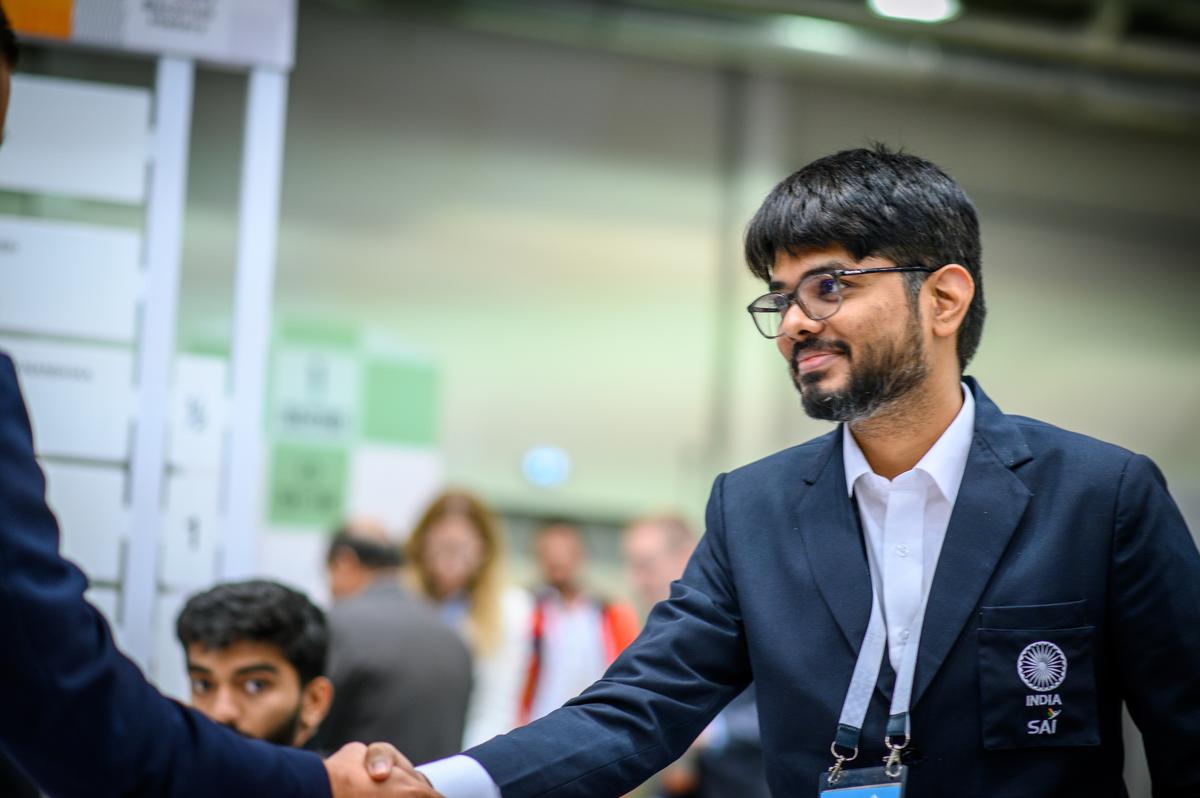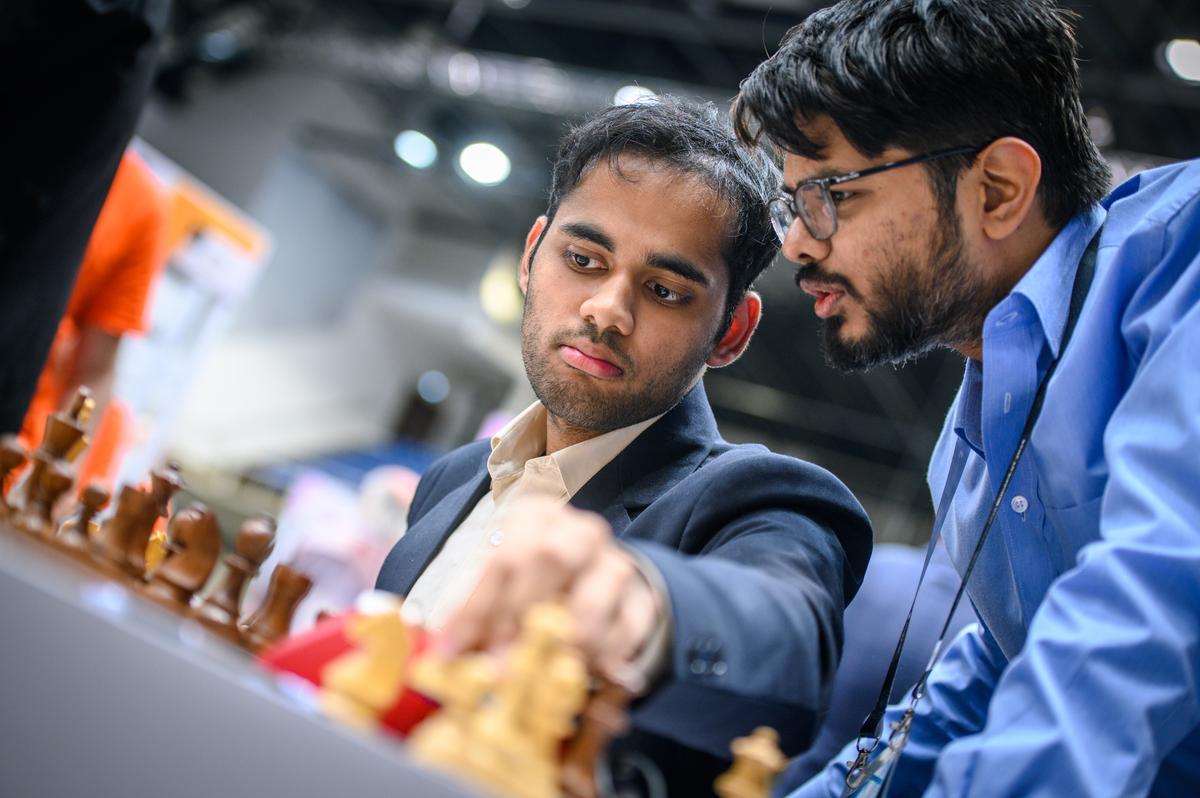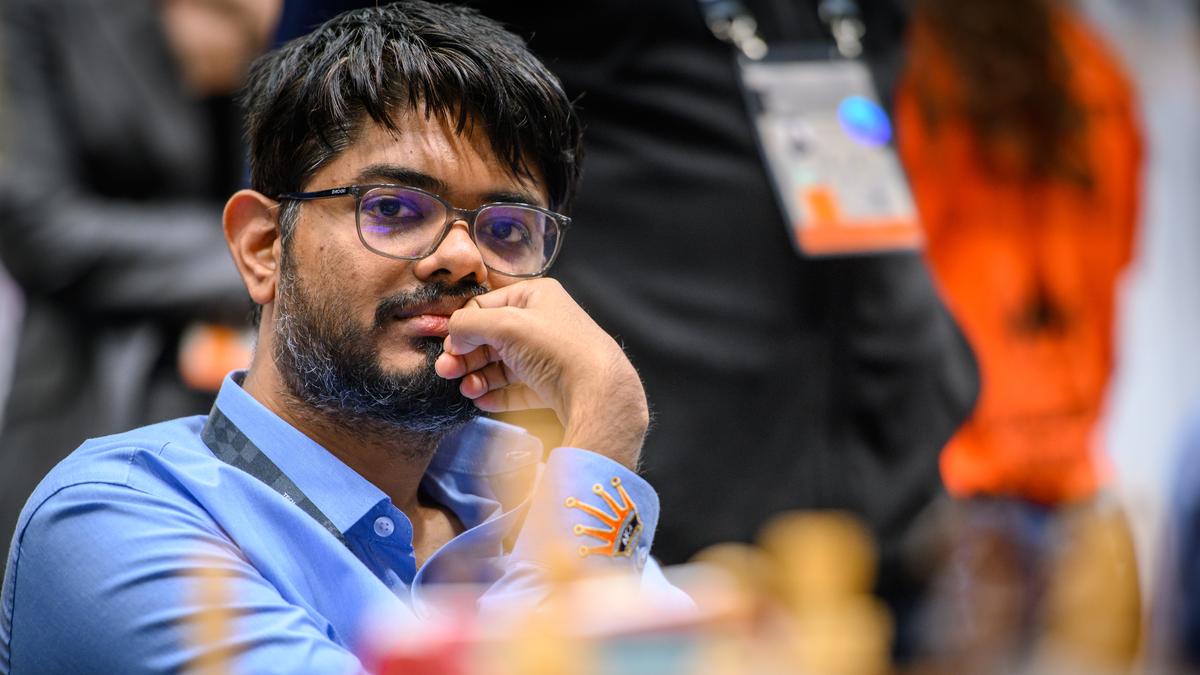‘Best role from where I can win’: Coach Srinath recalls Chess Olympiad 2024 win in Hungary
The Indian team’s splendid run at the Chess Olympiad 2024 saw it bagging its first-ever gold medal in both the Open and Women’s section in Budapest, Hungary.
Out of 193 teams in the Open and 181 in the Women’s section, India also retained the Gaprindashvili Cup, awarded to the country with the best overall performance across both categories.
While the women’s team surpassed Kazakhstan for the top prize in a closely fought battle, the men’s team had an exemplary run in the 11-round Swiss tournament. It accounted for 21 points out of 22, winning 10 rounds while drawing just one.
While D. Gukesh and Arjun Erigaisi stole the spotlight with their impressive performances, while also claiming individual gold, much of the credit also goes to India’s non-playing captain and coach, Srinath Narayanan, for his crucial role in orchestrating the team’s success.

Srinath Narayanan during the 2024 Chess Olympiad.
| Photo Credit:
FIDE/Michał Walusza
Srinath Narayanan during the 2024 Chess Olympiad.
| Photo Credit:
FIDE/Michał Walusza
Srinath, an experienced captain, has led India in several high-profile events, including the FIDE Online Chess Olympiad 2020 (where India was joint winner with Russia), the 2021 Online Chess Olympiad and 2022 Chess Olympiad in Mahabalipuram, and the 2022 Asian Games.
In an exclusive interview with Sportstar from Frankfurt, on his way back to India, Srinath discussed the team’s strategy, the impressive run of this young squad, individual performances, and much more.
Excerpts:
Q. India has won gold in both sections and secured individual gold on four boards across categories. How does it feel to lead this team? What are your initial thoughts?
Right now, I’m just eager to get some sleep. It will take a while for this achievement to sink in. It feels great, it’s a very special moment, but yes, it will take time to fully register.
Q. After missing out on gold in 2022 and with such a formidable lineup, was there added pressure to prove something to the world?
No, Not really. I didn’t see there was any added pressure. I mean, there’s always pressure, especially in any tournament where top players compete. Our players are expected to perform well and are often among the top seeds. So yes, there’s that pressure, but they’re used to it. Beyond the usual expectations, I don’t think there was any extra pressure.
Q. Srinath, you seem to have mastered the role of non-playing captain and coach in team events, leading the team at the last Olympiad, the Asian Games in Hangzhou, and now winning gold. How has this experience been for you so far?
For me, this is the best way to get these wins, the best role from where I can get these wins. So that’s one of the places where the enjoyment comes from. It helps that I am able to get into the shoes of the players and understand them to a certain extent drawing from my own experience as a player. I started working from under-16 Olympiad so the general philosophy has always been to get the team to have a good time with each other because that happens, it may not always guarantee good results, but usually it helps us play better.
Q. Tell us about the off-board dynamics. How did you plan a strategy before each round? Were the meetings serious or more casual?
We had team meetings every day, sometimes as small as 10-15 minutes, sometimes longer. Those were just casual, informal meetings where we would discuss each other’s games and make jokes. There were also a lot of positive vibes through these meetings rather than blaming each other or being critical of each other. So it fosters those positive vibes. It also helps draw from each other’s good results.
Q. Moving Arjun to board 3, instead of board 1 due to his rating, proved to be a masterstroke. Given India’s strength, any player could have played on any board. Whose idea was it, and what was the reasoning behind it?
The great thing about all the players was they were quite happy to do what was good for the team. So in that sense, I didn’t face any challenge from any of the players that they wanted to play on a fixed board. I felt it was fairly straightforward from our chess perspective.

Arjun Erigaisi (left) with Srinath during the Chess Olympiad 2024.
| Photo Credit:
FIDE/Michał Walusza
Arjun Erigaisi (left) with Srinath during the Chess Olympiad 2024.
| Photo Credit:
FIDE/Michał Walusza
Gukesh and Pragg have been playing a lot of elite events against the opposition of about 2700 mostly and Arjun has been playing a lot of games in opposition below 2700 in the last few months. So it was simply just letting them continue what they’ve been doing.
Q. Pentala Harikrishna played on the fifth/reserve board and held China’s in-form Wang Yue to a draw. There were talks ahead of the tournament that he didn’t deserve a spot. How do you assess his performance?
Hari was an an incredible support. He was aware of some of these talks on social media and in fact, he actually felt quite hurt by it. But he was able to use his experience and maturity to just come out of it before the tournament. And it’s not an easy change for him being on the first board for so many years and then moving to the reserve player role. But he was again quite happy to do whatever was good for the team.
He was an amazing asset, always being there, ready to play if required but also ready to rest if needed and not creating a negative environment because he was not getting any games. It was not quite anticipated that he would play so few games because rarely things go so ever so smooth.
Q. Anish Giri recently said that team performance has nothing to do with team camaraderie. Do you agree?
In my experience, team camaraderie really does matter. Having said that, the strength of the team also matters. You cannot point out or say that there’s exact science where you do something and it works every time. It’s all probability-based, but the team bonding does increase the probability.
Being in a good, positive space and around each other certainly helps you play better. But it’s of course not the only parameter. The way Gukesh and Arjun played, for instance, was just superhuman and you can’t assign any particular reason to why that happened. It just happened due to the individual brilliance.
Q. R. Praggnanandhaa was the only Indian player to drop a game in this tournament. He drew six of the 10 rounds he played. While solid, his performance didn’t match Gukesh and Arjun’s. What’s your take?
Pragg played normally, he played at a pretty high level. He was solid, he was difficult to beat. He performed at a rating well above 2700 in general and that’s pretty normal. If he performed at a 3000 rating level in every tournament, his rating would be 3000. And just because we have a few superhuman performances, we can’t take it for granted that it will happen every time.
Q. Vidit Gujrathi had a solid outing on board 4, going undefeated and scoring 7.5/10. He narrowly missed an individual medal. How impressive was his performance?
Yeah, Vidit is someone who is very solid and dependable. He rarely loses, even on the higher boards, and on board 4, he was definitely stronger than most of his opponents. It also helped being in an environment where you know the top three were scoring so well. So Vidit had all the pressure completely taken off of him.
Q. How special was it to win gold alongside the women’s team?
It’s really nice to see such a young team winning gold. I think one of the positives about both the open and the women’s teams is that they are all quite young. And they have quite a few more years to continue this dominance. I was also really eager for us to win gold in both sections because we knew India’s potential. But with the gold in both sections, the rest of the world also sees it.
Q. You mentioned continuing the dominance. With such a young team growing stronger, do you think India can dominate the chess world for the next 5-10 years, like China did before?
It’s certainly possible; the potential is there. But we shouldn’t get ahead of ourselves. This is our first Olympiad gold, and we need to win it a few more times before we can talk about dominance. The next Olympiad is a long way off, so we have the potential but it’s too early to be bullish about it.
Q. Were there any teams that India was particularly wary of—China, Uzbekistan, or the USA?
I felt the US was the only other team who were on completely equal terms with us. They had a very formidable team, their team had won gold in the past and they had been pretty consistent with medals each addition. Each of their players were world-class, part of the elite, so they were maybe one of the strongest teams out there. And of course, Uzbek and China were pretty high-quality teams as well.



